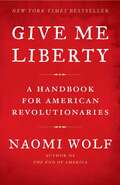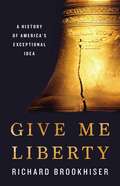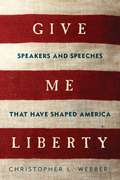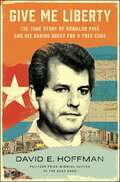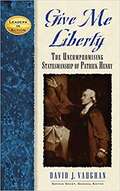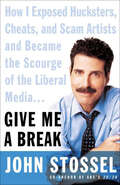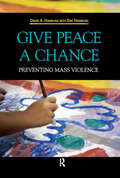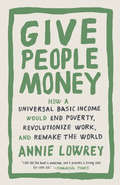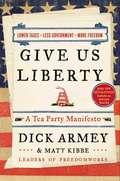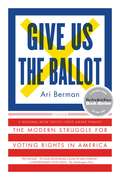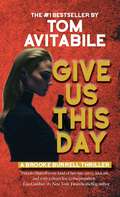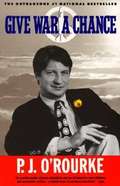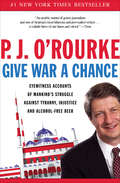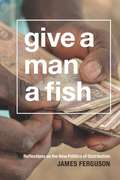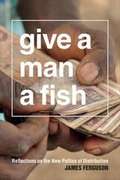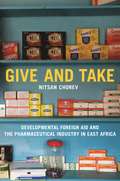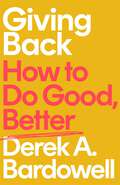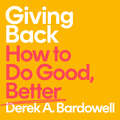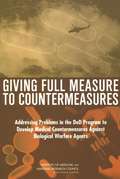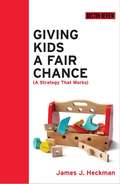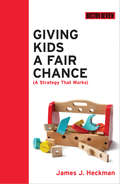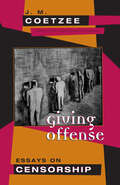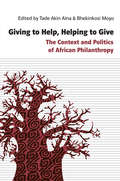- Table View
- List View
Give Me Liberty: A Handbook for American Revolutionaries
by Naomi WolfIn Give Me Liberty: A Handbook for American Revolutionaries, bestselling author Naomi Wolf illustrates the changes that can take place when ordinary citizens engage in the democratic system the way the founders intended and tells how to use that system, right now, to change your life, your community, and ultimately, the nation.As the practice of democracy becomes a lost art, Americans are increasingly desperate for a restored nation. Many have a general sense that the &“system&” is in disorder—if not on the road to functional collapse. But though it is easy to identify our political problems, the solutions are not always as clear. In Give Me Liberty: A Handbook for American Revolutionaries, bestselling author Naomi Wolf illustrates the breathtaking changes that can take place when ordinary citizens engage in the democratic system the way the founders intended and tells how to use that system, right now, to change your life, your community, and ultimately, the nation.
Give Me Liberty: A History of America's Exceptional Idea
by Richard BrookhiserAn award-winning historian recounts the history of American liberty through the stories of thirteen essential documentsNationalism is inevitable: It supplies feelings of belonging, identity, and recognition. It binds us to our neighbors and tells us who we are. But increasingly -- from the United States to India, from Russia to Burma -- nationalism is being invoked for unworthy ends: to disdain minorities or to support despots. As a result, nationalism has become to many a dirty word.In Give Me Liberty, award-winning historian and biographer Richard Brookhiser offers up a truer and more inspiring story of American nationalism as it has evolved over four hundred years. He examines America's history through thirteen documents that made the United States a new country in a new world: a free country. We are what we are because of them; we stay true to what we are by staying true to them.Americans have always sought liberty, asked for it, fought for it; every victory has been the fulfillment of old hopes and promises. This is our nationalism, and we should be proud of it.
Give Me Liberty: Speakers and Speeches that Have Shaped America
by Christopher L. WebberSure to become a classic of American oratorical history, ?Give Me Liberty reveals the enduring power of America's quest for a freer and more just society, and the context of the speeches and speakers--from Daniel Webster and Patrick Henry to Martin Luther King and Ronald Reagan--that gave voice to the struggle. ? "Give me liberty," demanded Patrick Henry, "or give me death!" Henry's words continue to echo in American history and that quote, and the speech it comes from, remains one of the two or three known to almost every American. The other speeches that have become part of our American collective consciousness all have one theme in common: liberty. These feats of oration seem to trace the evolution of America's definition of liberty, and who it applies to. But what exact is liberty? It is a term open to a broad range of opinion, and questions about freedom arise daily in the news and in everyday life. Perhaps uniquely among the nations of the world, the United States traces its origins to groups and individuals who specifically wanted create something new. Webber's insightful Give Me Liberty looks at these great speeches and provides the historical context, focusing attention on particular individuals who summed up the issues of their own day in words that have never been forgotten. Webber gleans lessons from the past centuries that will allow us to continue to strive for the ideals of liberty in the 21st century.
Give Me Liberty: The Story of the Declaration of Independence
by Russell FreedmanDescribes the events leading up to the Declaration of Independence as well as the personalities and politics behind its framing. Beginning with the Boston Tea Party, this stirring account introduces characters including Patrick Henry & Paul Revere, events such as the battles at Lexington & Concord, & ends with the Continental Congress & the drawing up of the Declaration of Independence. The events leading up to it plus the personalities and politics behind its framing.
Give Me Liberty: The True Story of Oswaldo Payá and his Daring Quest for a Free Cuba
by David E. HoffmanFrom the Pulitzer Prize–winning Washington Post reporter David E. Hoffman comes the riveting biography of Oswaldo Payá, a dissident who dared to defy Fidel Castro, inspiring thousands of Cubans to fight for democracy.Oswaldo Payá was seven years old when Fidel Castro seized power in Cuba, promising to create a &“free, democratic, and just Cuba.&” But Castro instead created an authoritarian regime with little tolerance of free speech or thought. His secret police were trained to crush dissent by East Germany&’s ruthless Stasi. Throughout Cuba&’s 20th century history, the dream of democracy was often just within reach, only to be dashed by dictatorship and revived again by a new generation. Payá inherited this dream and it became his life&’s work. As a teenager in Communist Cuba, he led a protest against the Soviet-led shattering of the Prague Spring. Before long, he was sent to Castro&’s forced labor camps. Payá later became a leading voice of opposition and formed a pro-democracy movement. A devoted Catholic, he championed a simple, bedrock belief that rights are bestowed by God, and not the state. Every day, he witnessed these rights trampled in Cuba. He could not stay silent. Payá&’s most daring challenge to the Cuban government was the Varela Project, a one-page citizen petition demanding free speech, a free press, freedom of association, freedom of belief, private enterprise, free elections and freedom for political prisoners. More than 35,000 people signed the Varela Project, an extraordinary outpouring of protest—with nothing more than pen and paper—against Castro&’s decades of despotism. The regime responded by ignoring the petition, arresting dozens of Payá&’s followers and sending them to prison for many years. After receiving multiple death threats, Payá was killed in a suspicious car wreck on a remote country road. Pulitzer Prize–winning reporter David E. Hoffman returns with an epic portrait of a lone individual who had the courage, faith, and persistence to struggle for democracy against an unforgiving dictator. At its heart, Give Me Liberty is a sweeping account of one country&’s tragic and continuing struggle for its freedom.
Give Me Liberty: The Uncompromising Statesmanship of Patrick Henry (Leaders in Action)
by David J. Vaughan George E. GrantHistorians speak of the shot heard 'round the world, but the American Revolution might better be described in terms of the speech heard 'round the world. <p><p> For more than two hundred years, the impassioned speech of Patrick Henry - I know not what course others may take, but as for me, give me liberty or give me death! - has resounded in the hearts and minds of freedom-loving people everywhere. Henry's life embodied the spirit of American courage and patriotism. Give Me Liberty goes beyond the oratory and eloquence to portray this remarkable man, his family, his ideas, and his times.
Give Me a Break: How I Exposed Hucksters, Cheats, and Scam Artists and Became the Scourge of the Liberal Media...
by John Stossel“Immensely thought-provoking,”* Emmy Award–winning TV presenter John Stossel’s Give Me a Break exposes the hypocrisy and corruption of the U.S. government.Working as a correspondent for 20/20 and Good Morning America, John Stossel confronted dozens of scam artists: from hacks who worked out of their basements to some of America’s most powerful executives and leading politicians. His efforts shut down countless crooks—both famous and obscure. Then he realized what the real problem was.In Give Me a Break, Stossel takes on the regulators, lawyers, and politicians who thrive on our hysteria about risk and deceive the public in the name of safety. Drawing on his vast professional experience (as well as some personal ones), Stossel presents an engaging, witty, and thought-provoking argument about the beneficial powers of the free market and free speech.“Powerful, well-argued.” —*Booklist
Give Peace a Chance: Preventing Mass Violence
by Eric Hamburg David A. HamburgIn Give Peace a Chance, the distinguished Dr. Hamburg teams up with his filmmaker son to tell the story of selected significant peace achievements over the past 25 years. Including lessons from personal experience, pithy quotes from interviews with international dignitaries, and the insights of a documentary sensibility, this book reflects upon striking moments in peace history and inflects them with the perspective of preventive medicine. From Jane Goodall's rainforest research station, to a hostage taking in Eastern Africa, to the Reagan-Gorbachev post-summit epiphany in Reykjavik, the Hamburgs take us there. They then distill the wisdom of these and many other encounters into an essential "six pillars of prevention"-education, early action, democracy building, socioeconomic development, human rights, and arms control. These six pillars are essential not only to reflections upon the past, but to future prospects emerging from recent challenges to peace-the Arab Spring, the violent repression in Syria, and the brewing faceoff with Iran. Features of this engaging text: Combines personal experience(including involvement in a hostage rescue mission) with ongoing research in a variety of areas over 50+ years. Includes feature quotes and vignettes from international figures including Kofi Annan, Sam Nunn, and Hillary Clinton, among many others. Builds upon six key pillars of prevention: education, early warning, democracy, development, human rights, and arms control. Concludes with prescriptions for peace action in four key areas: the US and Western democracies, the UN, the EU, and NATO. Offers carefully selected Recommended Readings for every chapter. See Stanford University's website for twenty-nine videotaped interviews with world leaders in the prevention of mass violence at http://lib.stanford.edu/preventing-genocide/list-interviews
Give People Money: How a Universal Basic Income Would End Poverty, Revolutionize Work, and Remake the World
by Annie LowreyA brilliantly reported, global look at universal basic income—a stipend given to every citizen—and why it might be the answer for our age of rising inequality, persistent poverty, and dazzling technology. <P><P>Imagine if every month the government deposited $1,000 into your checking account, with no strings attached and nothing expected in return. It sounds crazy. But it has become one of the most influential and discussed policy ideas of our time. The founder of Facebook, President Obama’s chief economist, Canada and Finland’s governments, the conservative and labor movements’ leading intellectual lights—all are seriously debating versions of a UBI. <P><P> In this sparkling and provocative book, economics writer Annie Lowrey looks at the global UBI movement. She travels to Kenya to see how a UBI is lifting the poorest people on earth out of destitution, India to see how inefficient government programs are failing the poor, South Korea to interrogate UBI’s intellectual pedigree, and Silicon Valley to meet the tech titans financing UBI pilots in expectation of a world with advanced artificial intelligence and little need for human labor. Lowrey also examines the challenges the movement faces: contradictory aims, uncomfortable costs, and most powerfully, the entrenched belief that no one should get something for nothing. <P><P>The UBI movement calls into question our deepest intuitions about what we owe each other. Yet as Lowrey persuasively shows, a UBI—giving people money—is not just a solution to our problems, but a better foundation for our society in this age of marvels.
Give Us Liberty: A Tea Party Manifesto
by Dick Armey Matt KibbeThis groundbreaking manifesto is essential reading for tea party activists--or any American seeking to understand what the Tea Party is fighting for and what's next for the movement. Former House Majority Leader Dick Armey and Matt Kibbe have been on the front lines of one of the fastest-growing and most influential political phenomena in recent memory: the Tea Party movement. As the leaders of the advocacy organization FreedomWorks, they have helped guide and give voice to hundreds of thousands of activists from across the country and have a strong vision for the future of this powerful grassroots uprising. United by a strong belief in limited government and individual liberty, Tea Party members are changing the American political landscape. Unlike mainstream media accounts that observe the Tea Party movement from the outside looking in, Give Us Liberty chronicles the roots and rise of a new breed of taxpayer activism in the voices of those who were there. Discover the personalities that drove the first meetings, the unknown candidates whose principled stand earned them unlikely victories, the march that gathered more than a million activists, and the bedrock beliefs that brought them together. In this national call to action, Armey and Kibbe provide an intimate history of the movement, explain how citizens can join the cause, and chart the future of the Tea Party--and America. Give Us Liberty also contains a battle-tested, step-by-step guide to organizing and effecting change in any community.
Give Us The Ballot: The Modern Struggle For Voting Rights In America
by Ari BermanCountless books have been written about the civil rights movement, but far less attention has been paid to what happened after the dramatic passage of the Voting Rights Act in 1965 and the turbulent forces it unleashed. In this groundbreaking narrative history, Ari Berman charts both the transformation of American democracy under the VRA and the counterrevolution that has sought to limit it from the moment the act was signed into law. The VRA is widely regarded as the crowning achievement of the civil rights movement, and yet―more than fifty years later―the battles over race, representation, and political power continue, as lawmakers devise new strategies to keep minorities out of the voting booth, while the Supreme Court has declared a key part of the Voting Rights Act unconstitutional.<P><P> Through meticulous research, in-depth interviews, and incisive on-the-ground reporting, Give Us the Ballot offers the first comprehensive history of its kind, and provides new insight into one of the most vital political and civil rights issues of our time.
Give Us This Day (Brooke Burrell)
by Tom AvitabileIt always starts out as routine, even when you are only doing it while your husband is deployed at sea. Even if it began as a safe, easy way to make enough cash to start a family. Even if there were no way you would ever get stuck doing it full time... after all, that's why you retired from the FBI.But then they killed off your prime witnesses all over the globe, erased all their digital fingerprints from a Wall Street hedge fund, blew up your office, tried to blow up St. Pats and, with unlimited funding from financial plays in the stock market, launched the biggest, most devastating attack ever directed against a city. One that no one saw coming. An unthinkable event that would have ramifications for the next one hundred years or more.And all you wanted to do was go home to Hawaii and coach high school soccer…Welcome to former FBI agent, Brooke Burrell's life. Her cushy assignment turns into a countdown to mega-death and destruction, keeping her and her hand-picked group of experts guessing what, where, and when the attack will be – right up until zero hour.GIVE US THIS DAY is a book with enough plausible authenticity that it will keep readers guessing what will happen next, whether they are in their living rooms or in government offices.
Give War a Chance: Eyewitness Accounts of Mankind's Struggle Against Tyranny, Injustice and Alcohol-Free Beer
by P. J. O'RourkeThe author dismantles victims ranging from backpack liberals to Lee Iacocca and surveys the collapse of communism, celebrity, and liberalism.
Give War a Chance: Eyewitness Accounts of Mankind's Struggle Against Tyranny, Injustice, and Alcohol-Free Beer
by P. J. O'RourkeIn the spirit of his savagely funny and national best-seller Parliament of Whores, Give War a Chance is P. J. O'Rourke's number one New York Times bestselling follow-up. O'Rourke runs hilariously amok by tackling the death of Communism, sanctimonious liberals, and America's perennial bad guy Saddam Hussein in a series of classic dispatches from his coverage of the 1991 Gulf War. Here is our most mordant and unnervingly funny political satirist on: Kuwait City after the Gulf War: "It looked like all the worst rock bands in the world had stayed there at the same time." On Saddam Hussein, O'Rourke muses: "He's got chemical weapons filled with ... chemicals. Maybe he's got The Bomb. And missiles that can reach Riyadh, Tel Aviv, Spokane. Stock up on nonperishable foodstuffs. Grab those Diet Coke cans you were supposed to take to the recycling center and fill them up with home heating oil. Bury the Hummel figurines in the yard. We're all going to die. Details at eleven."
Give a Man a Fish: Reflections on the New Politics of Distribution
by James FergusonThe author in this book examines the rise of social welfare programs in southern Africa, in which states make cash payments to their low income citizens.
Give a Man a Fish: Reflections on the New Politics of Distribution
by James FergusonIn Give a Man a Fish James Ferguson examines the rise of social welfare programs in southern Africa, in which states make cash payments to their low income citizens. More than thirty percent of South Africa's population receive such payments, even as pundits elsewhere proclaim the neoliberal death of the welfare state. These programs' successes at reducing poverty under conditions of mass unemployment, Ferguson argues, provide an opportunity for rethinking contemporary capitalism and for developing new forms of political mobilization. Interested in an emerging "politics of distribution," Ferguson shows how new demands for direct income payments (including so-called "basic income") require us to reexamine the relation between production and distribution, and to ask new questions about markets, livelihoods, labor, and the future of progressive politics.
Give and Take: Developmental Foreign Aid and the Pharmaceutical Industry in East Africa (Princeton Studies in Global and Comparative Sociology)
by Nitsan ChorevGive and Take looks at local drug manufacturing in Kenya, Tanzania, and Uganda, from the early 1980s to the present, to understand the impact of foreign aid on industrial development. While foreign aid has been attacked by critics as wasteful, counterproductive, or exploitative, Nitsan Chorev makes a clear case for the effectiveness of what she terms “developmental foreign aid.”Against the backdrop of Africa’s pursuit of economic self-sufficiency, the battle against AIDS and malaria, and bitter negotiations over affordable drugs, Chorev offers an important corrective to popular views on foreign aid and development. She shows that when foreign aid has provided markets, monitoring, and mentoring, it has supported the emergence and upgrading of local production. In instances where donors were willing to procure local drugs, they created new markets that gave local entrepreneurs an incentive to produce new types of drugs. In turn, when donors enforced exacting standards as a condition to access those markets, they gave these producers an incentive to improve quality standards. And where technical know-how was not readily available and donors provided mentoring, local producers received the guidance necessary for improving production processes.Without losing sight of domestic political-economic conditions, historical legacies, and foreign aid’s own internal contradictions, Give and Take presents groundbreaking insights into the conditions under which foreign aid can be effective.
Giving Back: How to Do Good, Better
by Derek A. BardowellDo you wish you could do more to change the world but don't know how? Do you ever look around at the many charities asking for donations and feel overwhelmed? This inspiring and uplifting book explores the effectiveness of charity and calls for more radical giving if we want to contribute to a better world. During a period when British society seems more divided than ever, and our decision makers are even more disconnected from the issues that keep us awake at night, Giving Back highlights the people and movements taking on some of the most challenging social issues of our time.A respected figure in philanthropy, Derek A. Bardowell presents a unique insight into what's going on inside the world of giving and where we can best make a difference.From redefining the role of charity itself to reimagining philanthropy through a reparative lens, Bardowell introduces a radical new take on how social problems, from climate change to racial injustice, can be tackled in modern society by all of us.Filled with lively insights and moving stories, Giving Back is here to break down the walls of charitable giving. If you loved Factfulness, Lost Connections, and What White People Can Do Next, this book will challenge some of your truths and change the way you give.What people are saying about Derek A. Bardowell:'Personal, political, powerful.' Bernardine Evaristo'Important and timely... Deeply felt and illuminating... Essential reading for everyone committed to fairness and equality in life.' Goodreads Reviewer, 5 stars'A valuable act of remembrance... While wealth may confer privileges, it doesn't rid you of melanin or exempt you from prejudice.' Colin Grant, Guardian'Bardowell does an excellent and passionate job of refracting the issues.' Financial Times'I absolutely loved it!... Such a good read on so many levels.' Goodreads Reviewer, 5 stars
Giving Back: How to Do Good, Better
by Derek A. BardowellDo you wish you could do more to change the world but don't know how? Do you ever look around at the many charities asking for donations and feel overwhelmed? This inspiring and uplifting book explores the effectiveness of charity and calls for more radical giving if we want to contribute to a better world. During a period when British society seems more divided than ever, and our decision makers are even more disconnected from the issues that keep us awake at night, Giving Back highlights the people and movements taking on some of the most challenging social issues of our time.A respected figure in philanthropy, Derek A. Bardowell presents a unique insight into what's going on inside the world of giving and where we can best make a difference.From redefining the role of charity itself to reimagining philanthropy through a reparative lens, Bardowell introduces a radical new take on how social problems, from climate change to racial injustice, can be tackled in modern society by all of us.Filled with lively insights and moving stories, Giving Back is here to break down the walls of charitable giving. If you loved Factfulness, Lost Connections, and What White People Can Do Next, this book will challenge some of your truths and change the way you give.What people are saying about Derek A. Bardowell:'Personal, political, powerful.' Bernardine Evaristo'Important and timely... Deeply felt and illuminating... Essential reading for everyone committed to fairness and equality in life.' Goodreads Reviewer, 5 stars'A valuable act of remembrance... While wealth may confer privileges, it doesn't rid you of melanin or exempt you from prejudice.' Colin Grant, Guardian'Bardowell does an excellent and passionate job of refracting the issues.' Financial Times'I absolutely loved it!... Such a good read on so many levels.' Goodreads Reviewer, 5 stars
Giving Full Measure to Countermeasures: Addressing Problems in the DoD Program to Develop Medical Countermeasures Against Biological Warfare Agents
by Acquisition of Medical Countermeasures Against Biological Warfare AgentsIn recent years, substantial efforts have been initiated to develop new drugs, vaccines, and other medical interventions against biological agents that could be used in bioterrorist attacks against civilian populations. According to a new congressionally mandated report from the Institute of Medicine and National Research Council of the National Academies, to successfully develop these drugs, vaccines, and other medical interventions against biowarfare agents, Congress should authorize the creation of a new agency within the Office of the Secretary of the U.S. Department of Defense. The committee recommended that Congress should improve liability protections for those who develop and manufacture these products, to stimulate willingness to invest in new research and development for biowarfare protection. Giving Full Measure to Countermeasures also identifies other challenges—such as the need for appropriate animal models and laboratories equipped with high-level biosafety protections—that will require attention if DoD efforts to develop new medical countermeasures are to be successful.
Giving Kids a Fair Chance
by James J. HeckmanIn Giving Kids a Fair Chance, Nobel Prize-winning economist JamesHeckman argues that the accident of birth is the greatest source of inequality in America today. Children born into disadvantage are, by the time they start kindergarten, already at risk ofdropping out of school, teen pregnancy, crime, and a lifetime of low-wage work. This is bad for allthose born into disadvantage and bad for American society. Current social andeducation policies directed toward children focus on improving cognition, yet success in liferequires more than smarts. Heckman calls for a refocus of social policy toward early childhoodinterventions designed to enhance both cognitive abilities and such non-cognitive skills asconfidence and perseverance. This new focus on preschool intervention would emphasize improving theearly environments of disadvantaged children and increasing the quality of parenting whilerespecting the primacy of the family and America's cultural diversity. Heckmanshows that acting early has much greater positive economic and social impact than laterinterventions -- which range from reduced pupil-teacher ratios to adult literacy programs toexpenditures on police -- that draw the most attention in the public policy debate. At a time whenstate and local budgets for early interventions are being cut, Heckman issues an urgent call foraction and offers some practical steps for how to design and pay for newprograms. The debate that follows delves deeply into some of the most fraughtquestions of our time: the sources of inequality, the role of schools in solving social problems,and how to invest public resources most effectively. Mike Rose, Geoffrey Canada, Charles Murray,Carol Dweck, Annette Lareau, and other prominent experts participate.
Giving Kids a Fair Chance (Boston Review Books)
by James J. HeckmanA top economist weighs in on one of the most urgent questions of our times: What is the source of inequality and what is the remedy?In Giving Kids a Fair Chance, Nobel Prize-winning economist James Heckman argues that the accident of birth is the greatest source of inequality in America today. Children born into disadvantage are, by the time they start kindergarten, already at risk of dropping out of school, teen pregnancy, crime, and a lifetime of low-wage work. This is bad for all those born into disadvantage and bad for American society.Current social and education policies directed toward children focus on improving cognition, yet success in life requires more than smarts. Heckman calls for a refocus of social policy toward early childhood interventions designed to enhance both cognitive abilities and such non-cognitive skills as confidence and perseverance. This new focus on preschool intervention would emphasize improving the early environments of disadvantaged children and increasing the quality of parenting while respecting the primacy of the family and America's cultural diversity. Heckman shows that acting early has much greater positive economic and social impact than later interventions—which range from reduced pupil-teacher ratios to adult literacy programs to expenditures on police—that draw the most attention in the public policy debate. At a time when state and local budgets for early interventions are being cut, Heckman issues an urgent call for action and offers some practical steps for how to design and pay for new programs.The debate that follows delves deeply into some of the most fraught questions of our time: the sources of inequality, the role of schools in solving social problems, and how to invest public resources most effectively. Mike Rose, Geoffrey Canada, Charles Murray, Carol Dweck, Annette Lareau, and other prominent experts participate.
Giving Offense: Essays on Censorship
by J. M. CoetzeeJ.M. Coetzee presents a coherent, unorthodox analysis of censorship from the perspective of one who has lived and worked under its shadow. The essays collected here attempt to understand the passion that plays itself out in acts of silencing and censoring. He argues that a destructive dynamic of belligerence and escalation tends to overtake the rivals in any field ruled by censorship.
Giving Offense: Essays on Censorship
by J.M. CoetzeeWinner of the 2003 Nobel Prize in Literature. J. M. Coetzee presents a coherent, unorthodox analysis of censorship from the perspective of one who has lived and worked under its shadow. The essays collected here attempt to understand the passion that plays itself out in acts of silencing and censoring. He argues that a destructive dynamic of belligerence and escalation tends to overtake the rivals in any field ruled by censorship. From Osip Mandelstam commanded to compose an ode in praise of Stalin, to Breyten Breytenbach writing poems under and for the eyes of his prison guards, to Aleksander Solzhenitsyn engaging in a trial of wits with the organs of the Soviet state, Giving Offense focuses on the ways authors have historically responded to censorship. It also analyzes the arguments of Catharine MacKinnon for the suppression of pornography and traces the operations of the old South African censorship system. "The most impressive feature of Coetzee's essays, besides his ear for language, is his coolheadedness. He can dissect repugnant notions and analyze volatile emotions with enviable poise."—Kenneth Baker, San Francisco Chronicle Book Review "Those looking for simple, ringing denunciations of censorship's evils will be disappointed. Coetzee explicitly rejects such noble tritenesses. Instead . . . he pursues censorship's deeper, more fickle meanings and unmeanings."—Kirkus Reviews "These erudite essays form a powerful, bracing criticism of censorship in its many guises."—Publishers Weekly "Giving Offense gets its incisive message across clearly, even when Coetzee is dealing with such murky theorists as Bakhtin, Lacan, Foucault, and René; Girard. Coetzee has a light, wry sense of humor."—Bill Marx, Hungry Mind Review "An extraordinary collection of essays."—Martha Bayles, New York Times Book Review "A disturbing and illuminating moral expedition."—Richard Eder, Los Angeles Times Book Review
Giving to Help, Helping to Give: The Context and Politics of African Philanthropy
by Bertha Chiroro Gérard Tchouassi Saïda Yahya-Othman Ibrahima Hathie Mohamadou Sy Jenny Hodgson Tade Akin Aina Kwaku Asante Darko Halima Mahomed Christa L. Kuljian James Muzondidya Marwa El Daly Connie Ngondi-Houghton Fondo Sikod Andrew Kingman Alan Fowler Susan Wilkinson-Maposa Kayode Samuel Bhekinkosi Moyo Robert Muponde Mohammed A. BakariThe past decade has seen a flowering of philanthropic activities across many parts of Africa. Unlike before, this flowering has the distinct character of African agency, energy and engagement. Philanthropy is no longer about narratives of passive, poor and miserable Africans receiving help from rich, fortunate and often Western outsiders. The emerging narratives about philanthropy in Africa are about an increasingly confident and knowledgeable assertion of African capacities to give not only to help but also to transform and seek to address the root causes of injustice, want, ignorance and disease. The narratives are also about the increasing questioning of the role and place of Africans in the world's philanthropic traditions and what constitutes African specificities but also African differences and varieties.This book is about African philanthropic experiences, their varieties, challenges and opportunities. It is about documenting, investigating, describing, questioning and reflecting on philanthropy in Africa. Because Africa is not a monolithic entity with one single history, cultural, political and economic experience, this ground-breaking book rightly tackles the varied modes, forms, vehicles and means in which the philanthropic experiences are expressed in Africa. It is a pioneering and ambitious effort in a field and community of practice that is new both in terms of scholarship and in professional practice. Many of the chapters boldly engage the burden of reflections, questions, ambivalences and ambiguities that one often finds in an emerging field, innovatively positing the outlines, concepts, frameworks and theories of scholarship and practice for a field critical to development on the continent.
